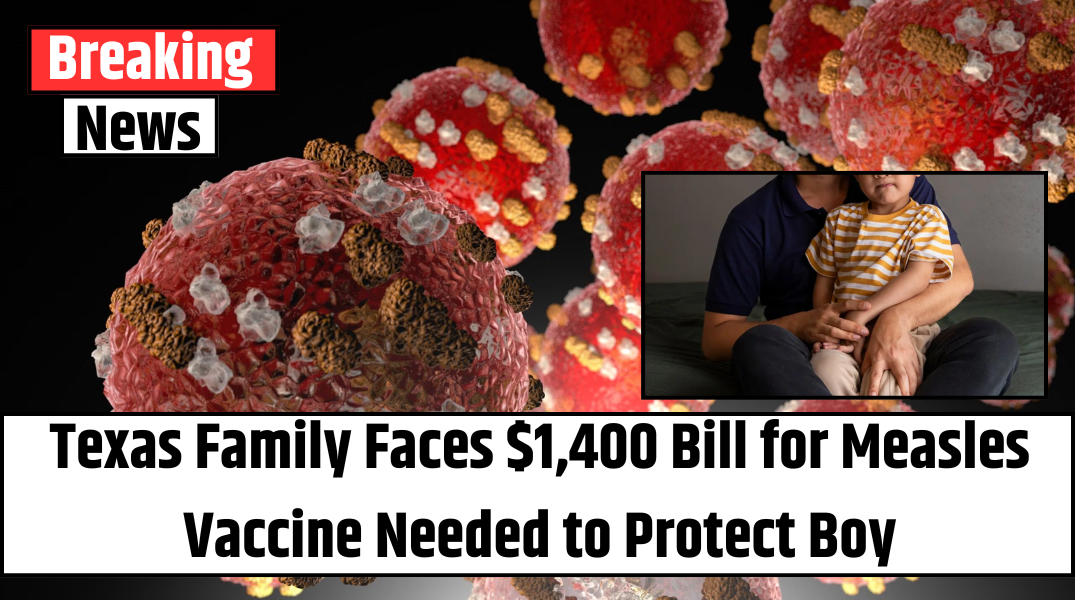Texas Family Faces $1,400 Bill for Measles Vaccine Needed to Protect Boy
As measles cases surged across West Texas earlier this year, Thang Nguyen took swift action to protect his young children. His 4-year-old son, Anh Hoang, had received only one dose of the two-dose measles vaccine series, and with the virus spreading rapidly, Nguyen wasn’t willing to take chances.
So in mid-March, he brought his family to a primary care clinic at the University of Texas Medical Branch (UTMB) in Galveston. During the visit, his son received the combined MMRV vaccine (measles, mumps, rubella, and chickenpox), along with other immunizations. His twin daughters, who had previously completed their measles shots, were also given additional vaccines.
Nguyen, a postdoctoral fellow in public health and infectious disease at UTMB, said he confirmed with clinic staff that their insurance would cover the cost of the visit and immunizations.
But then the medical bills arrived — and the real surprise began.
Staggering Costs Despite Preventive Care
UTMB billed $2,532 for just his son’s visit and vaccinations — including over $1,400 for the MMRV vaccine alone and $161 for administering it. In total, the family faced nearly $5,000 in charges for their children’s preventive care.
Nguyen, originally from Vietnam and in the U.S. on a temporary visa, had purchased a one-year insurance policy through broker TaiAn for his wife and kids. At $1,841, it was significantly cheaper than adding them to his employer-sponsored plan, which would have cost $615 per month. But what Nguyen didn’t realize was that the plan did not cover immunizations or checkups — critical gaps he discovered too late.
In Vietnam, he said, the care his family received would likely have cost less than $300. In the U.S., it turned into a multi-thousand-dollar dilemma.
Why Did This Happen? A Breakdown of Errors
When KFF Health News began investigating the case, UTMB admitted that mistakes were made. According to Kent Pickering, vice president of clinical contracting strategies at UTMB, two major errors contributed to the inflated bill:
-
Insurance Entry Mistake: Clinic staff incorrectly entered the insurance information, failing to flag the lack of vaccine coverage. Had this been caught, the family might have been directed to the Texas Vaccines for Children Program, which offers free immunizations to uninsured or underinsured kids.
-
Overpriced Vaccine Listing: An error in the hospital’s internal pricing list resulted in an MMRV vaccine price of over $1,400 — five times higher than the typical market price, according to CDC and GoodRx data.
While most Americans are protected from such surprises by Affordable Care Act (ACA) rules requiring coverage of preventive services like vaccines, Nguyen’s plan was exempt. Temporary visa holders and international students are not required to buy ACA-compliant plans for their first five years in the U.S., leaving many with limited coverage.
A Revised Bill—and a Resolution
Initially, Nguyen requested financial relief from UTMB’s billing office. A revised bill was issued with a 50% self-pay discount, bringing his son’s charges down to $1,266. But Nguyen remained concerned, especially since the vaccines were administered during a public health emergency.
Eventually, following media outreach, UTMB waived the cost of the vaccines entirely. Nguyen’s new bill was just $202.75 for the office visit, and similar reductions were made for his daughters’ visits.
Lessons for International Families and Uninsured Patients
Experts say Nguyen’s case illustrates the pitfalls of navigating the U.S. health system without fully understanding your coverage.
“People without insurance often pay significantly more than what insurers negotiate,” said Stacie Dusetzina, a professor at Vanderbilt University.
For families on temporary visas or those buying short-term health plans, it’s critical to read the fine print. Immunizations and preventive care aren’t always included.
Another valuable tip: Ask about public health resources. Many local health departments, like Galveston’s, participate in the Vaccines for Children Program, offering free vaccines to eligible kids under 19.
Additionally, always ask about discounts. Hospitals often have self-pay or charity care options for underinsured patients, and price negotiations can lead to significant savings.
A Public Health Concern Beyond One Family
While this case had a positive ending, experts warn that access to affordable immunizations may be at risk. Proposed federal budget cuts and staffing reductions could undermine public vaccination programs like Vaccines for Children — even as preventable diseases make a troubling comeback.
For Nguyen, the experience was eye-opening.
“It’s crazy to pay that much during a measles outbreak,” he said.
For other families, it’s a reminder to ask questions, explore options, and never assume that “routine” care comes with routine costs.







